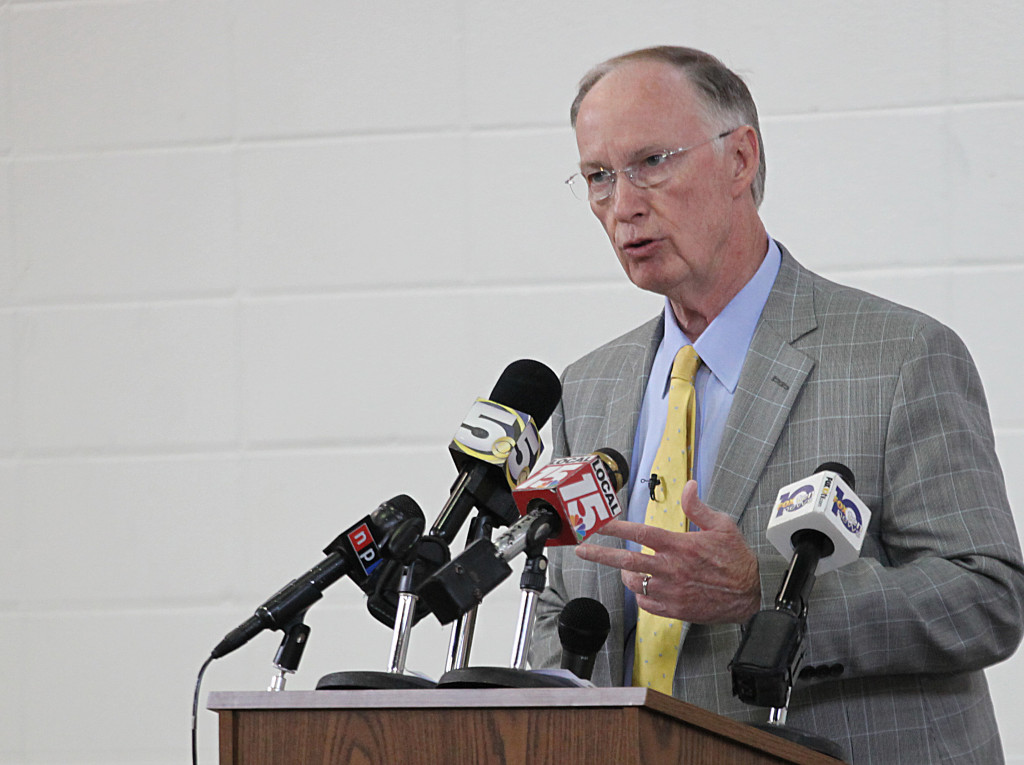#Hope4Gabe family excited to see “Right to Try” Act move closer to finish line

One family’s winding journey to secure medicine they hope could save their son’s life is several steps closer to the finish line. A group of Alabama lawmakers voted Wednesday in favor of House Bill 463, also known as the Right to Try Act. The bill says that doctors caring for people with terminal illnesses can prescribe medications that the Food and Drug Administration has deemed promising, but not yet ready for mass consumption. The Griffin family and their son, Gabe, are at the center of the legislation. Scott Griffin and his wife Traci live in Birmingham with their four children: Turner, age 14; Cooper, age 11; and 9-year-old twins, Gabe and Addie. In an interview with Alabama Today, Griffin said he and his wife had suspected since the twins were babies that Gabe wasn’t developing as quickly as his sister. “When you have a twin right beside him and she’s hitting all her benchmarks, and he’s not, it becomes a little evident that something’s not right,” Griffin said. “Our doctors kept saying, ‘Nothing’s wrong. He’s just a boy twin and they’re slower to develop.’ So we just kind of dismissed it. But something didn’t seem right.” The Griffin’s neighbor was the first to suggest that Gabe might need to be tested for muscular dystrophy. An occupational therapist, she sometimes babysat the kids and noticed subtle differences in Gabe’s attempts to stand and walk. She told the Griffins about Duchenne Muscular Dystrophy and recommended that 3-year-old Gabe see a doctor. Duchenne is one of nine types of Muscular Dystrophy. It causes generalized weakness and muscle wasting that increases over time and with muscle activity. The disease primarily effects boys and shows up between ages 3 and 5. According to the Muscular Dystrophy Association, boys with Duchenne typically did not survive beyond their teens. But advances in medical treatments and care have increased their life expectancy: “Survival into the early 30s is becoming more common and there are cases of men living into their 40s and 50s.” Scott Griffin says those medical advances could save Gabe’s life. “He’s 9 now. The typical progression of the disease is that by 10 or 12, they’re wheelchair bound. And then, between 17-20, they usually die.” He says that’s why the family started looking into cutting-edge therapies to slow – or even reverse – the degeneration of Gabe’s muscles. However, the drugs that the Griffins and their doctors feel would help Gabe are still going through the FDA approval process. “We believe those drugs could save him, but we can’t get them because they’re not FDA approved,” said Griffin. “And after years of petitioning the FDA, we decided to take our fight to the state level.” The Griffins started a foundation called Hope for Gabe (H4G) to raise awareness about Duchenne. They also enlisted the help of Michael Staley, former chief of staff to U.S. Congressman Spencer Bachus and current lobbyist at Birmingham law firm Waller Landsen Dortch and Davis, to educate legislators about the proposed law. Two lawmakers, Sen. Cam Ward and health committee chair Rep. April Weaver, agreed to sponsor legislation that would allow doctors to prescribe medication in the earliest stages of FDA approval to terminally ill patients. Sen. Ward’s bill has already passed the Senate. Today, Rep. Weaver’s legislation received a favorable report from the health committee and can move to the House floor for open debate. “Right to Try is the right thing to do,” Weaver said just after the committee vote. “I’m a mother and a nurse with more than 20 years in health care. I believe that anything that we can do to help doctors and terminal patients work together on their plan of care and remove barriers to treatment that might be beneficial is just the right thing to do.” Griffin said that the timing of the legislation is critical to securing medical treatment for Gabe. “Getting him these drugs now means that we can stop the disease before he needs a wheelchair or breathing tubes. They could even turn his condition around.” For Gabe, passing the Right to Try Act means being able to “ride a bike, run, and climb stairs like everybody else.” He said that he’s also looking forward to excelling in his favorite subject in school: physical education. Weaver said she hopes to see the bill head to the House floor by late next week.
Tuscaloosa Veterans greeted by Richard Shelby during Honor Flight to D.C.

Veterans of World War II and the Korean War arriving in Washington, D.C., via the Honor Flight from Tuscaloosa were greeted by a familiar face. U.S. Sen. Richard Shelby met them at the World War II Memorial on Wednesday “Today, I had the honor of meeting with and paying tribute to World War II and Korean War veterans from Tuscaloosa participating in their Honor Flight,” Shelby said. “This experience was both humbling and exciting, as these Alabama veterans had the opportunity to view the national memorials dedicated to their selfless service to our country. The valor and patriotism of our service members must never be forgotten nor taken for granted.” The Honor Flight helps veterans from across the country visit Washington, D.C., to see the memorials built in their honor. Flights are funded by donations from organizations and individuals. This particular trip was funded by the the Tuscaloosa Rotary Club, which has previously taken 423 veterans to the nation’s capital.
Robert Bentley stresses major budget cuts will ensue without quick remedy

Gov. Robert Bentley continued his crusade against the Legislature’s current budget Wednesday, issuing an announcement detailing severe cuts to Lee County unless the tax increases he is proposing — or perhaps recent a gambling expansion measure he omitted from mention — are adopted as part of an overall budget approach. “We are facing a tremendous crisis in our General Fund Budget that will impact every Alabama county if not addressed by the Legislature,” Bentley said in a prepared statement Wednesday afternoon. Specifically, the governor’s office said that Lee County — home to the city of Opelika and the college town surrounding Auburn University — would face harsh consequences, including the loss of temporary public assistance from the Department of Human Services for 405 children, layoffs for 15 court system employees, possible closing of the Lee County Armory and the Opelika Trooper Post, one of 13 Alabama state trooper posts. “I am committed to finding new revenue so our state agencies can continue to provide essential services to Alabamians. For decades, we have failed to address the way our non-education state agencies are funded,” Bentley said. “With no one-time money available to support the General Fund and debts that are owed, we have a real crisis on our hands. I encourage the residents of Lee County to let their elected representatives know that these cuts are unacceptable and will hurt the people in in Lee County.” Auburn University at Montgomery recently published a study which bolsters Sen. Del Marsh‘s proposal to allow a lottery and a handful of casinos across the state. The study suggested that such an expansion of gambling could help solve the $250 million state budget shortfall currently projected in during the next fiscal year. An initiative to do so is in the works in the Legislature, where Republican House budget chief Rep. Steve Clouse has joined 23 House Democrats in co-sponsoring an agreement that would call for a constitutional amendment that would make Alabama the 45th state in the nation to adopt some form of state lottery. The effort was the subject of a press conference convened Tuesday by Marsh.
State official: Hillary Clinton’s email practices “not acceptable”

A high-ranking State Department official said Wednesday it’s “not acceptable” for any agency employee to conduct government business on a private email server as former Secretary of State Hillary Rodham Clinton did. Joyce Barr, the agency’s chief freedom of information officer, made the comment under questioning from Republican senators who used a Senate Judiciary hearing on open records laws to attack Clinton over her email practices. Sen. John Cornyn of Texas said that Clinton’s approach amounted to a “premeditated and deliberate” attempt to avoid open records requirements. Sen. Thom Tillis of North Carolina said that anyone who took such an approach should be fired, and asked Barr whether it would be considered acceptable. Barr said that she had not been aware of Clinton’s decision to conduct all her State Department email on a private server but that the agency has now made it clear to employees that such an approach would not be acceptable. “I think that the actions that we’ve taken in the course of recovering these emails have made it very clear what people’s responsibilities are with regard to record-keeping,” she said. “We continue to do training, we’ve sent department notices, telegrams, we’ve talked to directors and I think the message is loud and clear that that is not acceptable.” Clinton, who is running for president, has defended using a personal email account while serving as secretary of state as a matter of personal convenience. She says she has turned over to the State Department all work-related emails — more than 30,000 of them — though House Republicans investigating the 2012 attacks on the U.S. mission in Benghazi, Libya, are demanding more. They insist the server itself should be examined by a third party. A spokesman for Clinton’s campaign declined comment. Clinton has agreed to testify on Capitol Hill later this month at the request of the special committee investigating the Benghazi attacks. Barr acknowledged problems with the State Department’s overall performance responding to open records requests, calling an existing backlog of 18,000 requests “unacceptable.” But she insisted improvements were being made even as the number of requests keeps growing and the agency is understaffed. Like other government agencies, the State Department is bound by laws including the Freedom of Information Act that generally require them to maintain records and make them available to the public when asked, with some exceptions. Karen Kaiser, general counsel at The Associated Press, testified that despite promises of greater transparency by the Obama administration, most agencies are not abiding by their legal obligations under open records laws. “Non-responsiveness is the norm, and the reflex at most agencies is to withhold information, not to release it,” she told senators. Lawmakers are weighing legislation to improve the Freedom of Information Act, but Kaiser said agencies should also be made to comply with the laws already enacted. “We can have all the wonderful laws on the books and the presumptions of disclosure written in, but if the agencies don’t abide by the requirements we’re in a bad position,” she said. Republished with permission of The Associated Press.
House budget panel weighs testimony on 2 plans to avert budget shortfall

Tuesday, the House’s General Fund budget committee weighed testimony on two proposals to save money as an overall plan to avert a state budget shortfall. Rep. Lynn Greer presented House Bill 588 a plan to convert two state holidays into furlough days while House Bill 590 from Rep. Arnold Mooney cuts longevity pay, a yearly payment made to state employees each December based on how long they have worked for the state, for the coming fiscal year. During the public hearing, Mac McArthur, executive director of the Alabama State Employees’ Association, urged the committee to delay voting on both bills until a decision had been made on Sen. Del Marsh’s gambling proposal. “Don’t balance the budget on the backs of state employees,” he said. “Are you going to look at those people who have served you over and over and tell them ‘We’re gonna cut your pay?’” The pressure is on for lawmakers to agree on a plan to avoid across-the-board budget cuts because of a budget shortfall. Gov. Robert Bentley has urged lawmakers to pass a set of tax increases in order to boost revenue to the General Fund. On Monday, the governor threatened to call a Special Session of the Legislature if lawmakers fail to approve his plan to increase revenue to the General Fund. The committee chairman indicated that the panel will reconvene on Wednesday for a formal vote.
Ronda Walker: Appreciating the 908th Airlift Wing and Maxwell AFB
I recently had the opportunity to fly in a C-130 from Maxwell Air Force Base in Montgomery to MacDill AFB in Tampa, Florida as part of a civic leader tour. The tour, hosted by the 908th Airlift Wing based at Maxwell, included about 30 Alabama business, political, and community leaders mostly from the River Region and Wiregrass. The purpose of the trip was to give Alabama leaders the opportunity to learn more about the mission and impact of the 908th Airlift Wing as well as the 927th Air Refueling Wing based at MacDill. Established in 1963 at Bates Field in Mobile, the mission of the 908th Airlift Wing is to recruit, organize and train Air Force Reservists to provide theater airlift and flexible combat support across the spectrum of military operations. In 1969 the 908th was moved to Maxwell AFB in Montgomery and after several aircraft changes they now fly the C-130. The C-130 accommodates a wide variety of oversized cargo, including utility helicopters and six-wheeled armored vehicles. It also accommodates standard palletized cargo, up to 92 military personnel, 64 paratroopers and can convert to an Aeromedical platform, moving up to 74 patients on life saving missions. This was my first time on a C-130 and the experience was fantastic. As stated, the C-130 is a cargo plane so this was not a luxury commercial flight. Typically passengers in the C-130 fly in netted seats along the aircraft’s two outer walls. But for our trip commercial grade airline seats were placed inside of the plane. As we boarded we were each given earplugs as the C-130 is not heavily insulated and the interior noise level is high. Again, because of the lack of insulation it gets cool inside the aircraft, so long sleeves and jackets were a must. We were encouraged to take a pit stop prior to boarding, but were told, “the latrine will be lowered and a curtain hung in the event anyone needs a comfort break in flight.” I made it to Tampa fine, but had too much coffee prior to boarding for the return flight so I got to experience a most unique “comfort break”. Just imagine balancing on something the size of a TV tray, several feet off the ground, while surrounded by a shower curtain! For take off I had the privilege of being seated in the cockpit of the plane. There were several military personnel in the cockpit manning the controls. We took off from Maxwell and flew west over Autauga County, we flew low over Wendland Farms in Autaugaville and enjoyed the view from above. Upon hitting our cruising altitude of about 22,000 feet the trip to Tampa took less than two hours. Upon arriving at MacDill we were greeted by Alabama native Col. Randall Bright, Commander of the 927th Air Refueling Wing. Col. Bright briefed us on their mission at MacDill and being a good Alabamian he also talked a little SEC football. The next 24 hours were filled with base tours, static displays, Central Command and Special Operations Command briefings, and a tour of the MacDill air traffic control tower. There are at least half a dozen airports in the greater Tampa area so the skies stay busy. The exterior deck around the tower offered great views of downtown Tampa as well as St. Petersburg. A highlight of the tower tour was seeing the air traffic simulator and learning about the rigorous training necessary to become an air traffic controller for the Air Force. There was not a wasted moment during our brief trip with the 908th. The trip was extremely well organized and executed. It was clear that the members of the 908th work very hard and take their jobs seriously, but they are also extremely proud of what they do. Commanded by Col. Adam Willis, the 908th is the best of the best and their contribution to Maxwell-Gunter and the entire River Region cannot be overstated. The economic impact of a military base on the local economy is something most civilians do not fully appreciate. The total economic impact of the 908th Airlift Wing is $69.3 million per year. They have 1,199 total people of whom 192 are full time and the rest part-time traditional reservists. Then if you expand the view and consider the impact of Maxwell-Gunter the numbers grow exponentially. The total impact of Maxwell-Gunter and all military missions and contractors in the River Region is $2.6 billion annually. Maxwell AFB has a payroll of $680 million and provides 24,500 jobs to include active, reserve, guard, Department of Defense civilians, and contractors that work on the installation. Everyone in the River Region should be thankful that we have Maxwell-Gunter in our midst. But of course the benefit is far beyond economics. The men and women serving in uniform are working for all of us, to protect us, and that is a debt we can never repay. Every day as we are out and about in town we see uniformed military personnel – in our grocery stores, restaurants, churches, and businesses. Let us never see one of these men and women without thinking of the sacrifices they make on our behalf. Express your gratitude to them generously, teach your children about these heroes who are willing to die for our freedom, and never forget that we are the land of the free because of these brave men and women. Ronda M. Walker is a member of the Montgomery County Commission.
Birmingham Mayor William Bell says gaming would bring thousands of per-hour jobs to city
Birmingham Mayor William Bell traveled to Montgomery today to show his support for Senate leader Del Marsh’s legislation to expand gaming options in Alabama. In a press conference today, Mayor Bell echoed Marsh’s call for a referendum on his gaming proposal. He added that at least half of the 11,000 jobs estimated in an economic impact study on the gaming proposal would go to Birmingham. “That means more wage-an-hour jobs, more earning power and more spending power for a lot of people in that area,” he said. “You would have those dollars turning over into the community, increasing the level of revenue we have at the municipal level to do a lot of the things that we currently do have revenue for.” Mayor Bell told ALToday.com that Marsh’s proposal would mean new construction, revenue, and jobs at Birmingham Race Course, specifically. He also said that added entertainment would make the city – and the state overall – an attractive option for larger conferences and conventions. “It would increase our economic footprint tremendously,” he said. The mayor dismissed concerns that a state lottery and more casino games could have a disparate impact on low-income residents, saying that a strong gaming commission could oversee how the facilities operate. “People are going to gamble,” he said. “I look at the various parking lots where people leave their vehicles to get on buses to go to Mississippi. That is money leaving our state to go to other areas, and we need to find a way to capture those dollars and keep them right here in the state of Alabama.” On Tuesday, Sen. Marsh introduced Senate Bill 453 a bill to establish an Alabama Lottery and authorize Vegas-style gaming in the state’s four existing racetracks. Gov. Robert Bentley has rejected the gambling proposal outright, saying that it would not address current budget concerns. “My legislation doesn’t deal with the immediate problems, but I think it solves the longer term problems,” added Marsh. “None of the other models bring jobs. This is as much about economic development as it is about solving our budget issues.” Marsh said he expected to hold a committee meeting in his legislation sometime next week.
House health committee in favor of patients’ “right to try”

Patients in Alabama with terminal conditions may soon have to the “right to try” certain promising medications. A House health panel gave a favorable report to a proposal brought by Rep. April Weaver that would allow doctors to prescribe drugs that the FDA has approved for clinical trials. Companion legislation has already passed the Senate. The legislation was inspired by 9-year old Gabe Griffin of Shelby County. Gabe suffers from an incurable disease called Duchenne Muscular Dystrophy. Duchenne causes generalized weakness and muscle wasting that increases over time and with muscle activity. Gabe and his family were at the committee meeting to hear the vote. Gabe offered a final plea to legislators considering the proposal: “I hope you pass my bill.” The panel passed the bill out of committee by unanimous voice vote.
Fetal Heartbeat Bill headed for House floor

Alabama is steps closer today to enacting legislation that would ban abortions where a fetal heartbeat is detected. The House’s Committee on Health gave a favorable report to House Bill 405, sponsored by Rep. Terri Collins. The bill passed out of committee by unanimous voice vote. The Fetal Heartbeat Act says that any Alabama doctor who performs an abortion when a heartbeat has been determined would be guilty of a class C felony. During a public hearing on the proposal last week, Rep. Collins said she introduced the bill because of her years volunteering in women’s health clinics. “More education – realizing that there is a heartbeat – is critical when moms are making these decisions. Protecting life is important.”
Latest GOP campaigns for White House star Hillary Clinton

el starred in two presidential campaign launches this week. Neither was her own. The leading Democrat was featured prominently by two Republican contenders, former Arkansas Gov. Mike Huckabee and former technology executive Carly Fiorina, whose road to relevancy in 2016 may be inextricably tied to the former first lady. As other Republicans begin to jab each other, both Fiorina’s and Huckabee’s nascent campaigns are based on the notion that they are uniquely positioned to defeat Clinton. Both may be overstating their cases. Huckabee didn’t explicitly mention Clinton on Tuesday even as he began a second presidential bid in the hometown he shares with her husband, Bill Clinton, the 42nd president. Yet the strategy was clear, as Huckabee and his senior aides cast him as a conservative populist outsider and the only Republican to have successfully taken on the Clinton political machine. The opening frames of Huckabee’s campaign video featured a black-and-white photo of the Clintons. In his speech, Huckabee recalled “challenging the deeply entrenched political machine that ran this state.” Later, he took a swipe at Hillary Clinton, noting that he doesn’t “have a global foundation” to help start his campaign. It was much the same for Fiorina, the only high-profile woman seeking the Republican presidential nomination, as she stepped into the presidential race the day earlier. Before appearing in her own announcement video, Fiorina began with a few moments of Clinton declaring her candidacy. “I would be running for president regardless of who the nominee on the Democratic side was, but really the point in highlighting her is that she is the personification of the professional political class,” said Fiorina, a former Hewlett-Packard CEO who has never held elected office. “She and her husband have been in politics their entire lives.” Fiorina, who ran for a Senate seat in California and lost to incumbent Democratic Sen. Barbara Boxer, emerged as one of the GOP’s most aggressive Clinton critics in the weeks leading up to this week’s announcement. She remains relatively unknown among the broader electorate, yet her aides suggest Fiorina has the ability to talk about issues and go after Clinton in ways her male colleagues cannot. “It is clear that, in sharp contrast to Hillary, people see Carly as genuine, authentic and trustworthy,” Sarah Isgur Flores, Fiorina’s deputy campaign manager, said in a campaign memo. Huckabee’s Clinton focus is more personal. His introductory campaign video is titled “Nailed Shut,” a reference to an office door being sealed off to him the day before he was sworn in as lieutenant governor in 1993 — a story he tells to illustrate what he was up against with the Democratic power structure in Little Rock. Clinton was governor until the end of 1992, before moving to the White House. His Democratic successor was caught in an ethics scandal and Huckabee ascended to the governor’s office. “There was a Democrat machine and (Bill) Clinton was the head of that machine,” said Arkansas Republican Chairman Doyle Webb. The man Huckabee beat remembers it differently. Now a Little Rock attorney, Nate Coulter said the Clintons didn’t campaign for him. “They had things that were, frankly, more important to them and the republic,” he said. Campaign materials that Huckabee aides distributed to reporters Tuesday framed Coulter as a Clinton stand-in. He had worked as an assistant legal counsel in the governor’s office before Clinton was elected president. “It’s a useful national narrative” for Huckabee to run as a Clinton rival, said Janine Parry, a political science professor at the University of Arkansas. “But in the state it seems like a stretch.” Perhaps most accurately, Huckabee is simply one of several Republican governors in the South who still had to deal with Democratic legislative majorities as the region evolved from a Democratic stronghold to near complete Republican control now, eight years after Huckabee left office. Jonathan Barnett, a former Arkansas legislator who first met Huckabee in high school, noted that Huckabee’s rise is linked directly to Clinton. The 1993 special election for lieutenant governor came about because Jim Guy Tucker ascended to the chief executive’s job when Clinton left Little Rock for the Oval Office. “Bill Clinton becoming president opened up a lot of doors for Mike Huckabee,” said Barnett, a Republican. “How about that?” Still, Webb, the party chairman, says, “You can’t argue there wasn’t a Democrat machine in the state.” And, perhaps even more noteworthy, Huckabee and Bill Clinton certainly share a political style built on connecting with working-class voters and small-town conservatives, which both men credit to their formative years in small-town Arkansas. “I still believe in a place called Hope,” Clinton said in a biographical video played at the 1992 Democratic National Convention and still played at small museum in his hometown. On Tuesday, Huckabee dusted off his own homage to Hope, repeatedly promising to take Americans “from hope to higher ground.” Republished with permission of the Associated Press.

